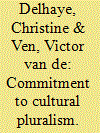|
|
|
Sort Order |
|
|
|
Items / Page
|
|
|
|
|
|
|
| Srl | Item |
| 1 |
ID:
127852


|
|
|
|
|
| Publication |
2014.
|
| Summary/Abstract |
Cultural policy has traditionally had close ties with the construction of the society as a nation state, which has been marked by its built-in tendency towards cultural homogenisation. Post-World War II, multicultural societies pose profound challenges to these traditional forms of cultural policy. Although, in the last decades, western democracies have been designing cultural diversity plans, this does not mean that governmental policies have successfully been translated in institutional practice. In the Netherlands, mainly established cultural institutions have failed to integrate diversity into their core business. Yet, there have been a few exceptions that continue to make attempts to adapt their programmes to address new populations. In this article, we use Parekh's view of a multiculturalism that reconciles unity and diversity, as a heuristic device that allows us to explore and examine the bottom-up diversity policies and practices of two Amsterdam-based cultural institutions: Paradiso and De Meervaart.
|
|
|
|
|
|
|
|
|
|
|
|
|
|
|
|
| 2 |
ID:
114800


|
|
|
|
|
| Publication |
2012.
|
| Summary/Abstract |
'Dagong' means 'working for the boss', and bespeaks the commodification of labour. Over the past two and a half decades, a minor literary genre has emerged from this dagong community, documenting the crushing effect of the industrial machine on the body and soul of rural migrant workers. This paper considers the paradoxical process of class formation and class dissipation through the prism of the debates and commentaries surrounding workers' poetry from elite cultural institutions and worker-poets themselves. This discussion suggests that these commentaries and debates constitute both class articulations and disarticulations, and together they point to the precariousness of the formation of working-class consciousness in contemporary China.
|
|
|
|
|
|
|
|
|
|
|
|
|
|
|
|
| 3 |
ID:
115049


|
|
|
|
|
| Publication |
2012.
|
| Summary/Abstract |
Westernization is a pervasive modern phenomenon. Its impact is more pervasive and pernicious than many people are aware and/or willing to admit. The spread of the dominant Western culture has caused a gradual demise of many peripheral cultures. The incursion of Western agents into Naga soil, beginning with British military conquest and American missionary intrusion, has resulted in a significant influence and westernization of Nagas and their culture and worldview. Consequently, it is almost a cliché to assert that since colonial contact the long-evolved Naga traditional values are being replaced by Western values. Today, the literal colonization of Nagas by the imperial West has ended, but the process of westernization is continuing, thanks to the ongoing influence being exerted by modern media, technology and other trends of globalization. My objective in this paper is not to highlight the 'form' or 'material' aspect of the culture, such as clothing (although mimicry in this area is almost faultless among a large section of Nagas), rather, my goal is to discuss the current state of mindset and fundamental cultural structures of the Nagas that have resulted from the adjustments in the lives and minds of the people because of the imposition of westernization. In fact, it is more than merely a process of adjustment consequent upon conquest, it is an extensive overhauling of cultural institutions, values and practices. I will underscore the westernization of some basic social structures and the mindset of the people.
|
|
|
|
|
|
|
|
|
|
|
|
|
|
|
|
|
|
|
|
|